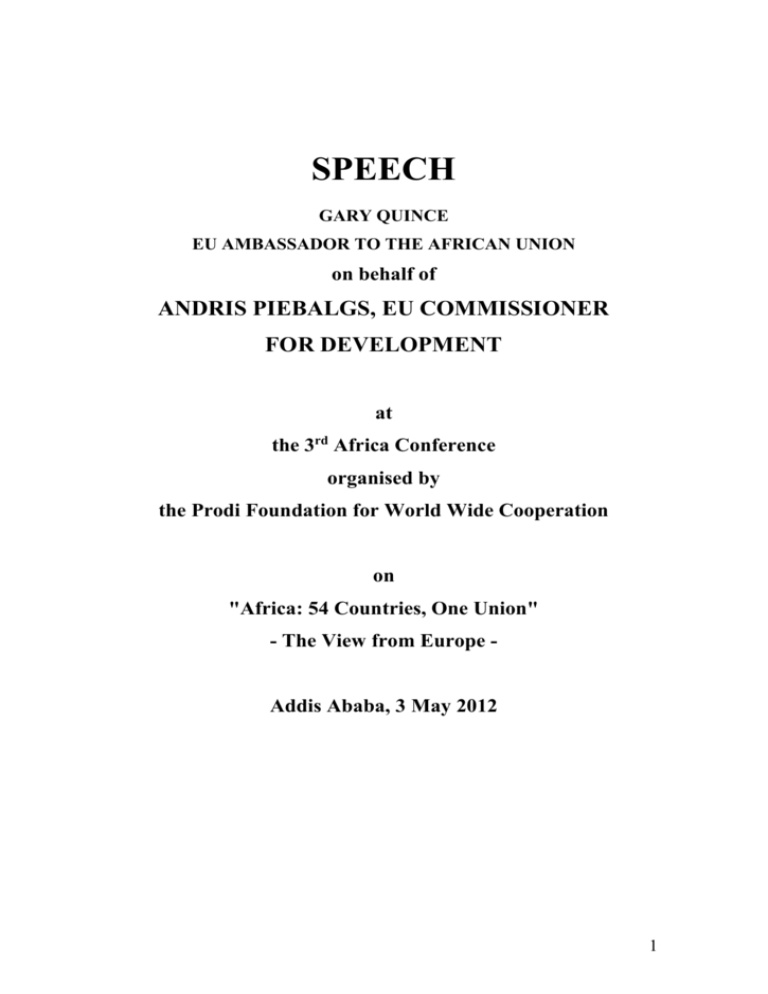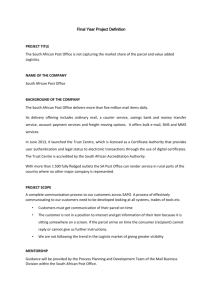Amb. Gary Quince, EU Special Representative for the African Union
advertisement

SPEECH GARY QUINCE EU AMBASSADOR TO THE AFRICAN UNION on behalf of ANDRIS PIEBALGS, EU COMMISSIONER FOR DEVELOPMENT at the 3rd Africa Conference organised by the Prodi Foundation for World Wide Cooperation on "Africa: 54 Countries, One Union" - The View from Europe - Addis Ababa, 3 May 2012 1 [Dr Ping], Distinguished Guests, Ladies and Gentlemen, Introduction: the AU today The African Union has achieved a huge amount since its creation. On the political front, we have seen very recently the rapid, determined and principled stance that the AU has taken to the recent coups in Mali and Guinea Bissau, as well as it leadership in the search for peace and security in Sudan and Somalia. On the economic front, the AU is the driving force for Africa's economic integration , leading plans for a Continental Free Trade Area as well as the Programme for Infrastructure Development in Africa. In the global arena, the AU has also been instrumental in establishing Africa as a global player of increasing importance, and a strategic partner for Europe in addressing key global and continental challenges such as peace and security, trade and climate change. The AU membership covers fifty-four countries, which is twice the number of Member States in the European Union. Fifty-four countries bring to the table different priorities, problems and interests. They represent many different cultures, religions and languages. This presents the African Union with even greater numerical challenges than we in the European Union have faced in moving the integration agenda forward. In order to create a successful Union, difficult choices must be faced, comprises found and tough decisions sometimes made. Africa, like the EU, must speak with one voice if it wants to influence the global agenda. And like the EU, Africa needs jobs and inclusive growth – for which well-functioning regional and continental markets and infrastructure networks are THE prerequisite. This means that resources have to be pooled and some powers and responsibilities have to be managed collectively. Finding the right balance between the national, regional and continental levels, is a continuous challenge which also we in Europe continue to face and which we don't necessarily always get right. But in historical terms over the past 50 years the trend in Europe is clear. Thanks to integration, Europe has enjoyed the longest period of peace, security and economic growth in modern history, after two devastating world wars. Thanks to integration, countries in Central and Eastern Europe have experienced a historic democratic transformation after the end of the Cold War. Thanks to integration, Europe continues to play a leading role on the international scene. And thanks to integration, Europe is today one single market for goods and services. Over 60 % of the EU's trade is within the EU market. The situation in Africa is very different : Africa's trade remains overwhelmingly with the rest of the world; only 10 % of Africa's trade is between African countries. 2 Two fundamental prerequisites for closer integration are political will and strong institutions. People – political leaders AND citizens – must agree that they can gain more from pooling their powers and resources in a globalised world in which national sovereignty becomes less relevant and where individual nations operating alone cannot hope to solve the burning issues of the 21st century. But political resolve by itself is not enough; successful integration has to go hand in hand with strong, well-resourced institutions. Neither factor happens overnight. In, Europe, it took decades of institutional reform, consecutive rounds of enlargement, as well as internal crises and outside pressures to translate our founding fathers' vision into political reality. And even today major challenges remain about the direction of European integration. In Africa the AU does not have supra-national legal powers. Every treaty, convention, protocol or charter adopted at AU level must be signed and ratified at national level before it enters into force. This takes a huge amount of time. Out of 42 AU treaties, 14 have not entered into force because the necessary ratifications have not yet taken place. These cover key areas such as maritime transport, culture, justice and human rights and counter terrorism. Many others have only been ratified by a minority of AU Member States. Working together So political and economic integration is not always plain sailing. However, we in Europe are convinced that it IS the right recipe for achieving peace and security, fighting poverty and building democratic societies and healthy economies. What has held true for Europe in our view holds true for Africa as well. This is why we have supported the African Union from its very early days. We are convinced that collective action by African countries is needed to address the major challenges that this continent faces : in other words pan-African solutions are required to address Africa's problems. We have also supported the African Union because we are convinced that Africa must have its own, strong voice on the international scene – be it in New York, Geneva, or here in Addis. We have also supported the African Union because we share a common interest in effective multilateralism, based on strong and representative institutions. And there is another very important reason: our two Unions are not only neighbours sharing a long history. Our combined 81 Member States also share core values and mutual interests which we can promote together. Working together we can achieve more than we could if we work apart. 3 For example, Europe and Africa have every interest to work together to make the Rio + 20 Conference a success. We know that this makes sense – above all following the Rio+20 preparation conference in Brussels last month. That event proved to be an important stepping stone to Rio; more importantly, it highlighted just how much European and African positions on Rio issues coincide. Ladies and Gentlemen, Europe and Africa have moved away from the traditional donor/beneficiary relationship. Under the Joint Africa-EU Partnership established in 2007, we work as equal partners in many traditional and new areas of cooperation. Future partnership As we look ahead to the fourth Africa/EU Summit at the end of 2013, we can be proud of the progress that we have achieved together since 2007, particularly in areas such as Peace and Security, Infrastructure and Energy, Science and Technology and Research and Development. But we must also face up to the new challenges which lie ahead of us. Our focus must be on action: translating commitments into concrete results and unlocking the potential of our strategic partnership. So what will be the main factors which will influence the direction of our Partnership. I would highlight three trends : i. If current high growth rates are maintained, Africa will become an increasingly important trade and investment partner over the next two decades. But at the same time, this high growth is not generating many new jobs, certainly not enough to meet the needs of a growing young population. ii. African views are increasingly important in multilateral fora, for example, in addressing global problems such as climate change, security, human rights and energy issues. iii. State fragility is likely to continue to be an issue in some parts of Africa, raising serious challenges to peace and security, regional stability, terrorist threats, in addition to high levels of suffering of their own populations and accompanying migration pressures. Faced with the challenges, the EU has developed theAgenda for Change, a blueprint for future EU development policy. We've called it the Agenda for Change for a reason: the shifting international context in which we are operating shows that we need to do things differently and more effectively. The changes in North Africa and the Middle East as well as the recent coups in West Africa have underlined just how much economic and social development and democratic governance are two sides of the same coin. You cannot have one without the other. 4 At the same time, the global financial crisis has hit Europe and other OECD economies hard. Last year global development aid fell for the first time in 15 years. And within the EU we can expect tough negotiations on the financing of the new EU budget for the next seven years starting in 2014. This means we will have to target our development aid more effectively in order to get better results. The Agenda for Change refocuses future EU development cooperation around two pillars. The first is democracy, rule of law, human rights and good governance. Our cooperation must support political and economic reforms. As we have seen most recently in Mali and Guinea Bissau, without strong governance institutions there will be no sustainable development. The African Charter on Democracy, Elections and Governance, which entered into force in February is an important step in establishing a common African approach to these fundamental values across the continent. We urge other African countries to ratify this Charter and look forward to reinforcing our cooperation with Africa in the context of the Africa-EU thematic partnership on Democratic Governance and Human Rights. The second pillar is supporting inclusive and sustainable growth. We need to work together to ensure that people, particularly young people, can benefit from growth by focussing our cooperation on sectors which can have a high impact on development, notably energy and agriculture, together with market liberalisation and improvements to the trade and business environment to encourage trade and private investment. One innovation which has already proved a big success across Africa is blending EU grants with loans from financing institutions to finance some of the major regional infrastructure investments that Africa needs to improve its regional and continental interconnections. Thus since 2007, the Africa-EU Infrastructure Trust Fund in SubSaharan Africa and the Neighbourhood Investment Facility in North Africa have together mobilised € 500 million in grants, blended with € 9 billion in loans to finance almost 70 major infrastructure projects across Africa, covering transport, energy, water and ICT. And we hope to boost our support to the energy sector in Africa through the UN Secretary General's "Sustainable Energy for All" initiative which aims to promote energy access, efficiency and use of renewables. We are firmly convinced that such innovative forms of cooperation together with the new policy priorities and principles of the Agenda for Change can help us to make a difference to Africa's development path and improve the effectiveness of our support. Ahead of the next Africa-EU Summit, planned for late 2013, we will reflect jointly with our African partners on how to adapt our Partnership to better support Africa to meet its new challenges and how best to mainstream the Agenda for Change in our cooperation agenda. 5 However, Africa's quest for unity, peace and development needs more than one partner. Our partnership sends a strong signal of the EU commitment to Africa. But it is also an invitation to other non-European partners of Africa to subscribe to the African integration agenda, and to help to make "54 countries, one Union" a reality. With partnership at the forefront of our minds, we in Europe continue to be inspired by the words of that great African statesman, the Reverend Desmond Tutu who said : "The only way we can hope to be prosperous, ultimately, is together". Thank you for your attention. 6








